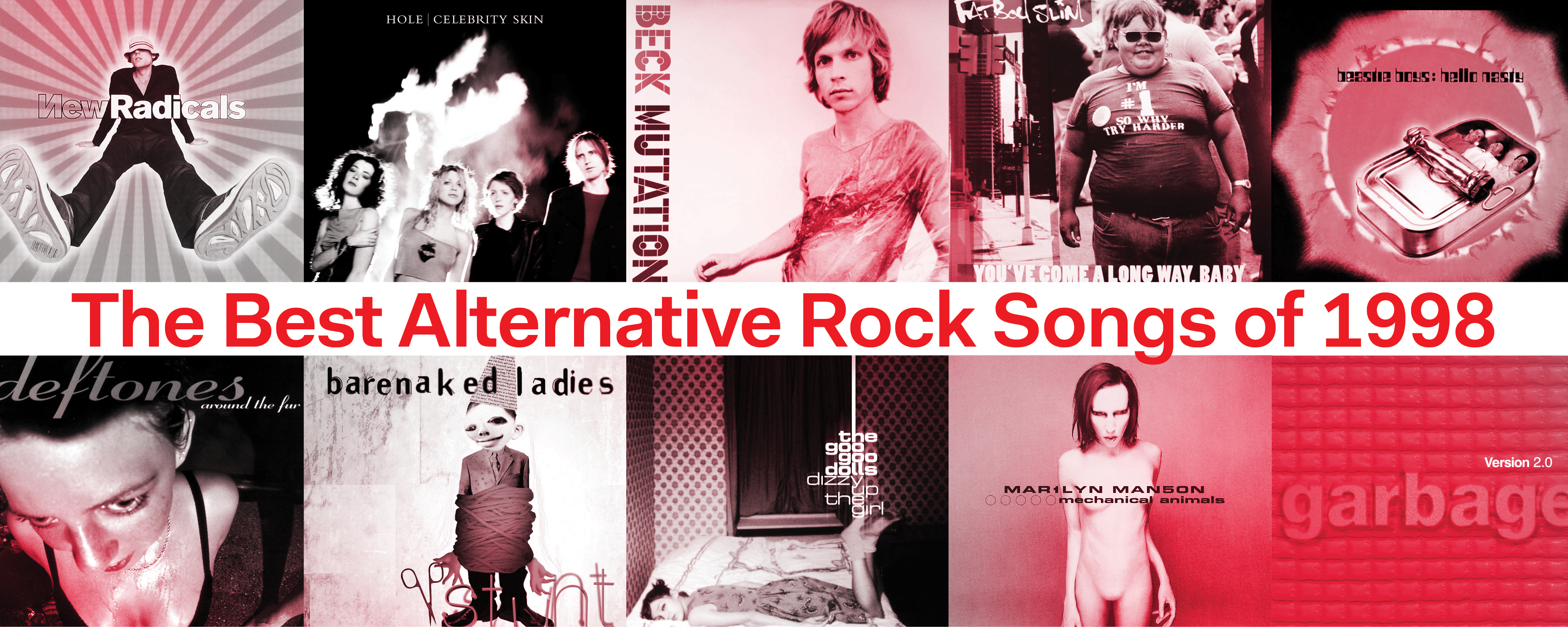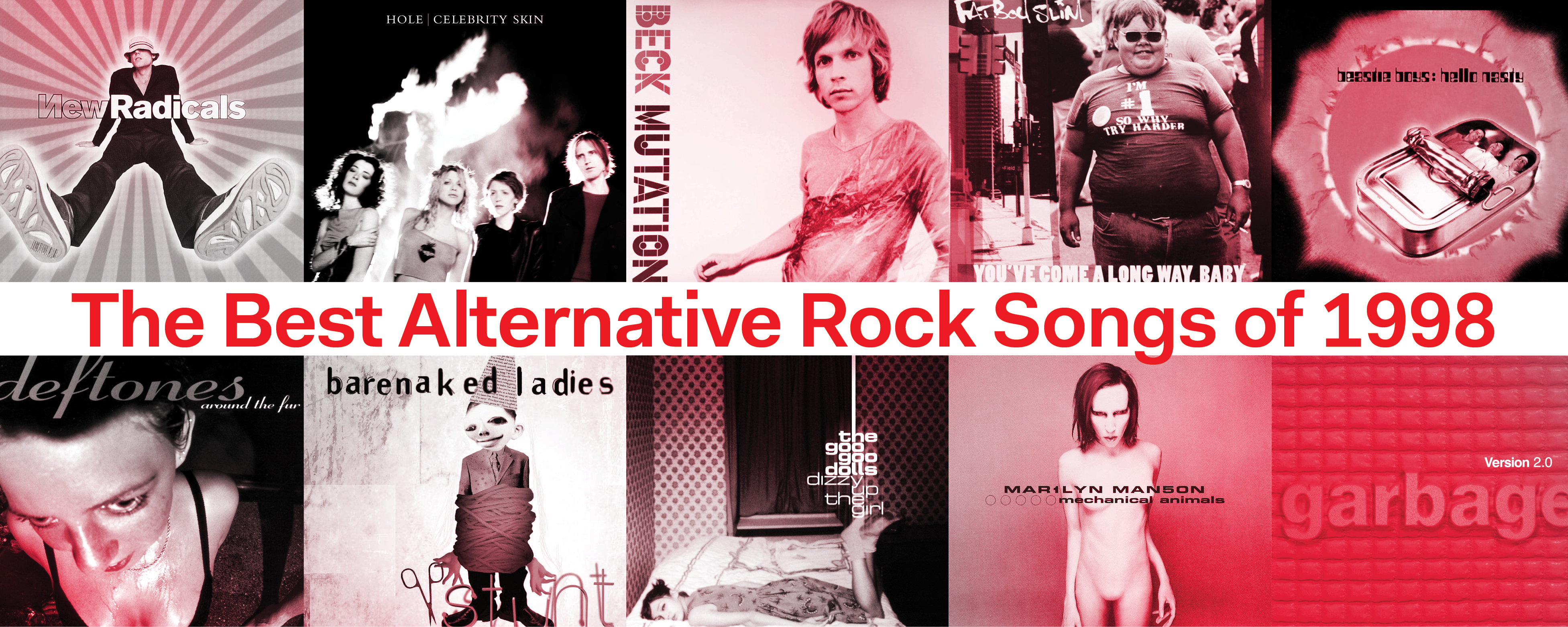40. Cake – “Never There”
Prolonging the Magic, the title of Cake’s third full-length, could be read as a joke about the seemingly clear one-hit-wonder status the band established for itself with its previous album. Fashion Nugget, and particularly its breakout single “The Distance,” had every element of what became the California band’s signature sound: lackadaisical spoken word vocals, a lightly danceable backbeat, spy-movie guitars and a Spaghetti-Western trumpet, and a distinctly ‘90s sense of ironic distance and pastiche. How could they match its success without simply replicating it? Try a little melody. “Never There” is a simple story of unrequited love, and befitting its relative earnestness, it features a chorus with some honest-to-god singing on it. Frontman John McCrea is no Mariah Carey, but it turns out he can carry a tune well enough. His bandmates help, offering a spacious minor-key groove and some spirited backing shouts to support his newfound emoting. It doesn’t quite match “The Distance,” but it’s enough to keep the party going. —AC
39. Beastie Boys – “Body Movin’”
The second single from Hello Nasty, the album that found the Beastie Boys returning to multi-colored hip-hop collage, “Body Movin'” began its life as a high-octane shuffle grounded in disco but flirting with soul-jazz and steel drums: the kind of cross-cultural hijinks that were the Beasties’ specialty in the ’90s. “Body Movin'” found its way to the charts in both the U.S. and the U.K. thanks to a remix by Fatboy Slim, who flattened its eccentricities, sped up the tempo and added a big beat, turning the Beasties into a group who seemed to chase trends instead of setting them. But the neat trick of “Body Movin'” is that it’s a gas in either incarnation. Yes, the album version is livelier and weirder, but the bright blare of Fatboy Slim’s mix stirs up a reminder of all the garish good times had at the tail-end of the ’90s. —STE

Also Read
The Year in 1998 Alternative Rock
38. Smashing Pumpkins – “Perfect”
The best song from the Smashing Pumpkins’ fourth album Adore, “Perfect” is a pop-rock gem that frontman Billy Corgan later wrote was inspired by the “coming break-up of two people I once thought I admired.” There’s a certain nostalgia to the track that, coupled with its synth-pop-indebted sound, drew comparisons to the instant-classic “1979.” Corgan and his team also made the connection, and decided to make a sequel of sorts to that song’s great video, with the same directors and most of the same cast. Alas, it couldn’t match the original, with Corgan inexplicably spending most of the clip’s runtime in a cowboy hat, singing atop a huge crane. He would later call the “Perfect” video “disappointing,” and the cause of a “tremulous, unfortunate delirium [in him] that would last a week.” Lackluster video aside, the song remains one of the Pumpkins’ best, a last gasp for one of the ‘90s’ biggest bands, who were about to see their cultural cachet quickly plummet. —TB
37. Everclear – “Father of Mine”
Everclear cleaned up on 1997’s So Much For the Afterglow, shedding the weight of grunge for a sound that sparkled in its quiet adventurousness. “Father of Mine,” the album’s third single, could almost pass for a New Order song for a few seconds, before comfortably settling into an airy sort of riffage. Ultimately, it’s all just a backdrop for singer Art Alexakis, who did not shy away from the spotlight. The song is painfully autobiographical, with bracing lyrics from Alexakis about the absence of his dad. He remembers the color of the sky when the two would take walks together, and the sound of his dad’s voice, but also domestic abuse, disappointing birthdays, and “a place inside that’s so hard to reach.” Rock stars of the time had no qualms about singing bluntly about personal demons, but “Father of Mine” especially feels like a therapy session you accidentally walked in on: “I will never be safe / I will never be sane,” Alexakis sings. “I will always be weird inside / I will always be lame.” The song is an exorcism, drawing out howls in an attempt to bring welled-up pain to the surface—and maybe, hopefully, watch it float away. —JS
36. Matchbox 20 – “Real World”
Why do we wake up every day as the same person? Rob Thomas wrestles with this existential question over the length of “Real World,” the third deathless mainstream rock hit from Matchbox Twenty’s Yourself or Someone Like You. How does Thomas—at this point, in the pre-Santana infancy of his career, merely the diet Adam Duritz—release himself from the terror of continuity? By reimagining himself as a “rainmaker” who… stores his rain “in boxes with little yellow tags” on them. Sounds like some distant bureaucracy dictated the shape of this dream! If Matchbox Twenty didn’t come off as fatally sober—how crisp and unhallucinated are these guitar tones?—I’d characterize the progression of Thomas’ daydreams as the shallow-yet-deep musings of the inanimately stoned. Still, it’s fun. As a popular alt-rock single of the time—the dawn of the yarl—it’s practically weightless, and I think it’s curious and bold for a song called “Real World” to have such a flimsy relationship with reality. —BN
35. Rob Zombie – “Dragula”
Rob Zombie’s “Dragula” proved that, for a specific set of music fans, a tribute to the Munsters could be considered the hardest rock single out. Rob Zombie’s blaring, glottal nightmare of a single was derived from some of the tamer source material he referenced on his solo debut, 1998’s 13 Tales of Cadaverous Cavorting Inside the Spookshow International. It would also make for one of the most striking musical moments in The Matrix, released the following year, thanks to a remix by Zombie/Nine Inch Nails collaborator Charlie Clouser. “Dragula” is essentially an excuse for the chorus, which is one of the most tuneful moments in Zombie’s discography. It’s a tribute to driving a haunted car–a steampunk, industrial version of “Little Deuce Coupe” for the shock rock era. Zombie’s voice on the track is one big echoing choir of bellows, peaked out into oblivion. In the nauseating video, he cavorts with kitschily costumed devils, robots, and fellow undead metalheads. Looking back, it’s clear that Rob Zombie’s true destiny as a solo force was always going to be filmmaking and theater. The fact that “Dragula” worked musically was almost just a happy accident. —WCW
34. PJ Harvey – “A Perfect Day Elise”
PJ Harvey’s fourth album Is This Desire is a tour through the eyes of different characters invented by Harvey. The landscapes they wander are sometimes as hollowed out with silence as the surface of the moon. “Elise” pulls images from JD Salinger’s “A Perfect Day for Bananafish,”—a short story about a war veteran who shoots himself in front of his sleeping wife—and packs them into an oddly translucent rock song. Peripheral synth string drones and gathering sub-bass frequencies unsettle and disturb “A Perfect Day Elise,” so that it sounds as if it’s loosening from its own hinges and creaking in the wind. —BN
33. Oasis – “All Around the World”
“All Around The World” is one of the first songs Noel Gallagher ever wrote, but he kept it in his pocket until he could give it the epic arrangement it deserved. The time arrived in 1997, when Oasis had more money than sense thanks to the international success of (What’s The Story) Morning Glory. Be Here Now, its overblown sequel, was designed to dwarf its predecessor. “All Around The World” was meant as the album’s denouement, the moment where the band shoved all the guitars, strings and harmonies they could find into ten minutes meant to evoke the soaring spirits of “Hey Jude.” Really, all that pomp accentuated the fact that this is a song Noel wrote before he knew how to write songs. Of course, that’s its charm: beneath the blare, it’s possible to hear the Beatles-besotted teen swinging for the stars in his bedroom. The lads were stars themselves by this point, but they not only hadn’t lost sight of their teenage dreams. And on one wonderful, ridiculous track, they tried to make them all come true. —STE
32. Barenaked Ladies – “One Week”
If, for some reason, you go to Reddit seeking information about Canadian alt-pop superstars Barenaked Ladies, you might find an earnest analysis of their chart-topping hit “One Week,” which argues that the rippity-rap word-salad barnburner is actually a subversively tragic narrative about a man murdering his wife with a golf club. A few off phrases may tempt you to consider the point: “Five days since you tackled me / I’ve still got the rug burns on both my knees.” You turn over lines in your head like morsels of Chickity China, the Chinese chicken, unsure whether they have been cooked through. For instance: What to make of the song’s shoutout to Akia Kurosawa, which colored the impressions of the great director for an entire generation of millennial cinephiles? More effectively than any coded narrative of brutality, “One Week” showed that you could be a grown man who savors Japanese art films and still writes hot babbling nonsense like this—a song that seems custom designed for close-reading by middle schoolers hopped up on Capri Sun and Sour Patch Kids. —WCW
31. Fuel – “Shimmer”
This all-time got-dumped anthem does shimmer: like gasoline pooled on asphalt. The Epic signees keep the pity party moving briskly, dissolving fidgety rhythm guitar into a spare string arrangement, then punching the pedals for the caustic part. “She dreams a champagne dream… lavender and cream,” Brett Scallions sneers of his imminent ex. Unlike, say, Green Day’s “Good Riddance” or Bush’s “Glycerine”—forebears in string-quartet-aided kiss-off rock—“Shimmer” didn’t quite crack the Top 40, a feat they’d finally manage with 2000’s truly harrowing “Hemorrhage (In My Hands)”. —BS




